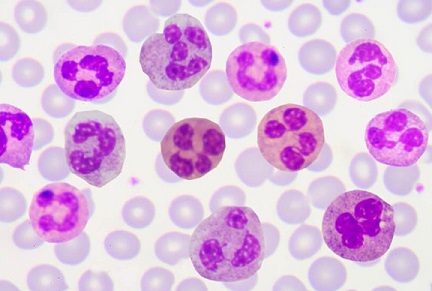Groundbreaking Thailand Medical Research on Neutrophil Diversity and Iron Overload in Beta-Thalassemia
Nikhil Prasad Fact checked by:Thailand Medical News Team Oct 03, 2024 6 months, 3 weeks, 2 days, 8 hours, 5 minutes ago
Thailand Medical: In an exciting new study, researchers from Chulalongkorn University in Bangkok, Thailand, have uncovered crucial insights into how iron overload in beta-thalassemia patients affects neutrophils.
Neutrophils, a type of white blood cell, play a crucial role in the body's defense against infections. For beta-thalassemia patients, whose inherited blood disorder condition requires regular blood transfusions, understanding neutrophil function is critical, as these patients are more susceptible to infections. This
Thailand Medical News report will discuss the research that sheds light on neutrophil diversity, including immature, aged, and low-density neutrophils, and how these variations contribute to immune dysfunction.
 Groundbreaking Thailand Medical Research on Neutrophil Diversity and Iron
Groundbreaking Thailand Medical Research on Neutrophil Diversity and Iron
Overload in Beta-Thalassemia
Key Study Findings
In their study, the researchers examined blood samples from beta-thalassemia patients and healthy volunteers. Using advanced techniques such as flow cytometry, they discovered that beta-thalassemia patients have a higher proportion of immature neutrophils (CD16− CD62L+) and aged neutrophils (CD16+ CD62L−) than healthy individuals. These findings suggest that neutrophils in beta-thalassemia patients may not function as efficiently in fighting infections.
The research team also found that low-density neutrophils (LDNs), which typically exist in the peripheral blood of beta-thalassemia patients, exhibit a greater capacity for secreting enzymes and producing reactive oxygen species (ROS). These LDNs, however, suppress the body's immune responses, particularly by hindering T-cell activity, which is essential for combating infections.
The study further demonstrated that iron overload, a common issue for beta-thalassemia patients due to frequent blood transfusions, exacerbates neutrophil dysfunction. By incubating healthy neutrophils with a combination of red blood cell lysates and ferric ions, the researchers simulated iron overload conditions. They observed that this combination increased the production of aged neutrophils and LDNs, which likely diminishes the body's ability to respond to bacterial infections.
Neutrophil Diversity and Its Impact
Neutrophils are traditionally thought to be uniform in their function, but recent research has revealed that they are more diverse than previously understood. The study highlights three distinct types of neutrophils: immature, mature, and aged. Immature neutrophils typically lack the full range of defensive capabilities, while aged neutrophils have a decreased ability to travel to infection sites, potentially leaving patients more vulnerable to infections.
One significant finding of the study is that the diversity of neutrophils in beta-thalassemia patients, particularly the increase in immature and aged cells, correlates with a reduced ability to fight off infections. This correlation was establishe
d through analysis of various parameters such as phagocytosis (the process by which cells engulf and destroy pathogens) and chemotaxis (the movement of neutrophils toward infection sites).
The impaired function of neutrophils in beta-thalassemia patients, particularly their reduced capacity for chemotaxis and phagocytosis, suggests that the body’s immune response is severely compromised. This immune suppression could explain the higher infection rates observed in these patients, with pneumonia being the most common infectious disease.
Low-Density Neutrophils and Immune Suppression
The study also sheds light on the role of LDNs in suppressing immune responses. LDNs are a subset of neutrophils found in the peripheral blood mononuclear cell (PBMC) fraction. The researchers noted that LDNs were far more abundant in beta-thalassemia patients than in healthy controls.
LDNs are known for their ability to suppress immune functions, particularly through the production of enzymes like arginase I, which depletes essential nutrients required for T-cell development. As T-cells are vital for coordinating the body’s immune response, their suppression leads to a weakened ability to fight infections. The study found that beta-thalassemia patients had higher levels of arginase I, which correlated with the abundance of LDNs, suggesting that LDNs contribute significantly to immune suppression.
Iron Overload’s Role in Neutrophil Dysfunction
The research also highlights how iron overload, a major complication in beta-thalassemia, impacts neutrophil function. Patients with beta-thalassemia often require frequent blood transfusions, leading to an accumulation of excess iron in their bodies. This iron overload not only affects vital organs like the liver and heart but also alters the function of immune cells, including neutrophils.
The researchers found that when healthy neutrophils were exposed to conditions mimicking iron overload, their function was significantly impaired. The study showed that exposure to ferric ions led to the formation of aged neutrophils and LDNs, both of which exhibited reduced functionality in fighting infections. This finding underscores the importance of managing iron levels in beta-thalassemia patients to maintain immune health.
Iron chelation therapy, which helps reduce iron levels in the body, could therefore play a crucial role in preventing immune dysfunction in beta-thalassemia patients. By reducing iron overload, patients may experience improved neutrophil function and a decreased risk of infections.
Conclusion: The Future of Beta-Thalassemia Treatment
This study provides important insights into how iron overload and neutrophil diversity affect immune function in beta-thalassemia patients. The increased presence of immature and aged neutrophils, combined with the suppression of T-cell activity by LDNs, highlights the complexity of immune dysfunction in these patients.
The findings suggest that managing iron levels through chelation therapy could help mitigate some of the immune dysfunction associated with beta-thalassemia. However, more research is needed to fully understand the mechanisms behind neutrophil diversity and its impact on infection rates in these patients.
Further studies will also be crucial in developing targeted therapies to improve neutrophil function and enhance the immune response in beta-thalassemia patients. In the meantime, healthcare providers must continue to monitor iron levels and manage infections aggressively to ensure the best possible outcomes for patients.
The study findings were published in the peer-reviewed International Journal of Molecular Sciences.
https://www.mdpi.com/1422-0067/25/19/10651
For the latest research news, keep on logging on to
Thailand Medical News.
Read Also:
https://www.thailandmedical.news/news/thailand-medical-researchers-discover-breakthrough-in-stroke-recovery-using-marine-algae
https://www.thailandmedical.news/news/thailand-medical-study-unveils-lemongrass-oil-s-powerful-anticancer-and-antimicrobial-properties
https://www.thailandmedical.news/news/thailand-medical-study-warns-of-growing-numbers-of-antimicrobial-resistant-bloodstream-infections-acquired-in-hospitals
